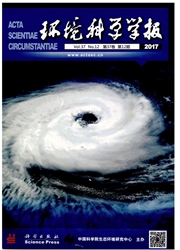

 中文摘要:
中文摘要:
通过温室盆栽试验,初步研究了UV—B辐射对灌浆期小麦叶片中黄酮类化合物含量日变化的影响.结果发现,UV-B胁迫条件下,黄酮类化合物含量明显上升,而胁迫解除后,其含量下降,与对照组间差异逐渐减小.合成黄酮类化合物的关键性酶——苯丙氨酸解氨酶活性的变化也表现出大致相同的趋势.同时,UV—B辐射对小麦叶片净光合速率没有影响,但使其夜间呼吸速率显著加强.这些结果表明,小麦在UV—B胁迫解除前后黄酮类化合物的持续波动可能是植物在UV—B辐射条件下光合能力未受影响而生物量明显下降的一个重要原因.
 英文摘要:
英文摘要:
Pot cultivation experiments in greenhouse were conducted to study the effects of enhanced UV-B radiation on the diurnal variations of flavonoids in wheat leaves during grain filling stage. The results showed that the flavonoids content of wheat leaves increased significantly under the enhanced UV-B radiation at daytime, and then declined at night when they were released from the stress of UV-B radiation. Meanwhile, the difference of flavonoids content between control and UV-B treatment decreased gradually. The activity of phenylalanine ammonialyase also showed a similar trend with that of content of flavornoids. Simultaneously, the net photosynthetic rate of wheat was not affected by supplementary UV-B radiation, but the respiration rate was enhanced significantly at night. The results implied that the continuous fluctuation of flavonoids content might be another explanation why biomass was reduced significantly while plant net photosynthesis was not influenced by enhanced UV-B radiation.
 同期刊论文项目
同期刊论文项目
 同项目期刊论文
同项目期刊论文
 期刊信息
期刊信息
